Advertisement
Mistakes, Forgiveness And Public Figures
ResumeWho deserves public forgiveness? Paula Deen? Eliot Spitzer? Anthony Weiner? Alec Baldwin? We’ll look at forgiveness.

Celebrity chef Paula Deen has taken a licking for a racial slur uttered 25 years ago.
Alec Baldwin left Twitter after what read like homophobic rants.
Anthony Wiener shared lewd snaps with strangers — and now he’s running for mayor of New York. Eliot Spitzer went to prostitutes while responsible for the law, and now he’s running for office again.
The list of the flawed and fallen in public life is long — think Mark Sanford, Martha Stewart, David Patreaus, Bill Clinton.
When do we forgive, and when do we not?
This hour, On Point: Forgiveness in American public life now.
--Tom Ashbrook
Guests
Alina Tugend, author of The New York Times Shortcuts column and author of "Better by Mistake: The Unexpected Benefits of Being Wrong." (@atugend)
Robin Regina Ford, an interdisciplinary educator whose work focuses are American literature, popular culture, critical literacy and identity. She blogs at Writing Identity. (@DrRobinWriting)
Roxanne Roberts, co-author of The Washington Post's pop culture column, The Reliable Source.
Interview Highlights
Robin Regina Ford on whether voters would support Anthony Weiner:
My idea of forgiveness is the realization that all people are flawed, and that we accept each other's flaws and if the person who has wronged us in someway is willing to make amends, and try to learn from there mistakes and change then you forgive. I don't know if Anthony Weiner has had enough time to learn from his mistakes, but on the other hand his mistakes weren't that egregious. His wife forgives him, and it really doesn't matter to me as a voter what he tweeted.
Roxanne Roberts on the "common denominator" among public figures who have transgressed:
I am going to go old testament ... which is a little more judgmental. I think that what is the common denominator between all of these people is that they've made a contract with us — particularly politicians but celebrities too. [They] say "I am a kind of person that is worthy of your support, votes," "Buy my cookbooks," "Do something because you think I am a kind of person that you admire." Now I do think there is a separate issue, which is a political question, which is the skills of a politician versus their moral universe and their private lives.
Roxanne Roberts on public apologies:
Part of this discussion is whether or not they want something from us. Politicians want our vote, and so they're saying, "I am really sorry. I feel really bad, and I won't do it again," which is what 5-year-olds say to their parents.
Alina Tegund on how the American public enjoys scandal:
A professor I once spoke to said, "Forgiveness should be a hope, not a claim." People don't have the right to demand forgiveness ... I think we, the American public, love this sense of outrage that we get. Over and over we're incredibly shocked when a celebrity lets us down. And then we slowly start forgiving them again, and this seems to be the scenario we play out over and over. I think the American public gets something out of it.
From Tom's Reading List
The New York Times: Sometimes It's Good Not To Forgive — "It seems, these days, that we can barely keep pace with the tales of the famous and near famous who climb to great heights, plummet to great depths and then try to work their way back into the public’s affection."
Salon: I'm Black, And I Forgive Paula Deen — "Deen is a product of the place and time in which she was raised. There are many Southerners who are proud of their Confederate roots, whose ancestors owned slaves, as Deen’s did. But without honest dialogue between all races, some, perhaps like Deen, won’t ever understand why such reminders of our racist past are still so painful, even in 2013. Particularly in 2013."
Time: After Sex Scandal, Eliot Spitzer Makes a Comeback -- "Disgraced by ties to a prostitution ring, the former governor announced his candidacy for New York City comptroller angling to challenge Wall Street once again."
This program aired on July 9, 2013.